|
|
|
Sort Order |
|
|
|
Items / Page
|
|
|
|
|
|
|
| Srl | Item |
| 1 |
ID:
135245


|
|
|
|
|
| Summary/Abstract |
This article explores the relationship between justice and effectiveness in bilateral and multilateral arms control negotiations. A set of hypotheses, derived from earlier research about the impacts of procedural and distributive justice on negotiation outcomes is evaluated. The sample consists of twenty cases, ten bilateral and ten multilateral. The results of statistical analyses show strong effects of procedural justice on the effectiveness of bilateral, but not multilateral, negotiations. Further analyses indicate that the effects are largely accounted for by half of the bilateral cases. Case-by-case analyses reveal some of the conditions that explain the correlation between pj principles and effective outcomes. Distributive justice correlated with more substantial agreements in the multilateral cases. Reasons for the limited effects of procedural justice on multilateral outcomes are discussed. The article concludes with more general implications and suggestions for further research.
|
|
|
|
|
|
|
|
|
|
|
|
|
|
|
|
| 2 |
ID:
135249
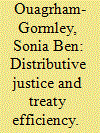

|
|
|
|
|
| Summary/Abstract |
This article evaluates the security value of controls over biotechnology transfers and of new restrictions on the spread of scientific results: to what extent do they improve the implementation of the Biological Weapons Convention (bwc)? Although the questions of justice that have plagued the bwc regime since its creation in 1972 have been analyzed extensively, the effects of current controls over dual-use research and the propagation of scientific results on the implementation of the bwc have not been fully addressed. It is argued that although controls over biotechnology transfers increase security because they delay covert programs by creating integration challenges, controls on the spread of scientific results have no security value. They instead may lead to a decreased implementation of the bwc.
|
|
|
|
|
|
|
|
|
|
|
|
|
|
|
|
| 3 |
ID:
135247
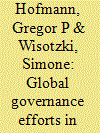

|
|
|
|
|
| Summary/Abstract |
This article focuses on the role of justice claims for issues of global governance. Conflicting justice convictions held by states can become considerable stumbling blocks for multilateral negotiations. Normative claims which call for strengthening individual rights, such as human rights or human security, often collide with statist sovereignty convictions, such as the right of non-intervention, territorial integrity and non-interference. Conflicts between negotiating parties also occur on questions of distribution, recognition and procedural justice. The article argues that such justice conflicts affect the outcome of negotiations. Two recent negotiation processes and governance efforts at the United Nations are examined: the Responsibility to Protect (2005) and the Arms Trade Treaty (2013).
|
|
|
|
|
|
|
|
|
|
|
|
|
|
|
|
| 4 |
ID:
135243
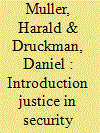

|
|
|
|
|
| Summary/Abstract |
This article provides an overview of this thematic issue. We discuss four issues about the role of justice claims in international relations (ir) scholarship: the discrepancy between the historical centrality of justice themes in political thought and empirical research in ir; challenges to the assumption of utility-maximizing motives; justice in the context of rules or norms of negotiation, and the rise of empirical research on justice in ir. We conclude with themes suggested by the contributing authors in this issue and suggest priorities for further research on justice in international negotiation.
|
|
|
|
|
|
|
|
|
|
|
|
|
|
|
|
| 5 |
ID:
135250


|
|
|
|
|
| Summary/Abstract |
The Fissile Material (Cutoff) Treaty (fm(c)t) has been on the negotiation agenda since 1996, but has seen little progress. This is due to a fundamental disagreement over whether emphasis should be placed on nuclear disarmament or nuclear non-proliferation. Several delegations perceive the fm(c)t as a tool to draw in states from outside the non-proliferation regime, while others understand it to be a disarmament measure that reduces quantities of fissile materials for nuclear weapons. They however, regard the unwillingness of nuclear weapon states to engage toward this end as deeply unjust. Additional disagreements also concern justice: Should there be different standards of verification? May some states continue to produce unverified military fuel? As long as the nuclear weapon states only push their interests through pure power instead of respecting the notion of justice, no progress can be expected and the non-proliferation regime will further erode.
|
|
|
|
|
|
|
|
|
|
|
|
|
|
|
|
| 6 |
ID:
135244


|
|
|
|
|
| Summary/Abstract |
Modern empirical social science is unique in denying, dismissing, or discounting the role of justice considerations in human behavior. A relatively small group of International Relations (ir) scholars have attempted to address this lacuna, with limited uptake to date. The articles in this issue collectively seek to move this research program forward. In this essay, I explore various conceptual, epistemological, methodological, and sociology-of-the-field issues that may be responsible for its limited traction thus far and argue that only the last represents a serious obstacle. Whether recent trends and developments in ir indicate that the time may finally be ripe for a robust normal science on the role of justice considerations in international politics remains to be seen, but negotiation theorists are in the best position to move it forward.
|
|
|
|
|
|
|
|
|
|
|
|
|
|
|
|
| 7 |
ID:
135248
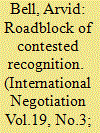

|
|
|
|
|
| Summary/Abstract |
Resistance to negotiation and the continuation of violence dictate the course of events in the Afghanistan conflict. However, several studies have thoroughly explored the interests of the main parties to the conflict and a settlement that respects their key demands is possible. The current military situation resembles a “hurting stalemate,” which according to rationalist assumptions should compel the parties to move toward negotiations. This article argues that the main obstacle to negotiation is an underlying and unaddressed conflict of recognition between the United States, the Afghan government, and the Taliban. While each party believes it is driven by justice claims, they perceive their opponents to be driven by a hostile strategy informed by incompatible interests. Relying on the Cultural Theory of International Relations, this article explores the parties’ motives in the conflict, focusing on the need to strive for esteem and honor. It suggests that the reciprocal acknowledgement of legitimate identity-related justice claims could remove a key obstacle to formal negotiation.
|
|
|
|
|
|
|
|
|
|
|
|
|
|
|
|
| 8 |
ID:
135246
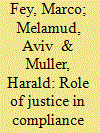

|
|
|
|
|
| Summary/Abstract |
Compliance is a central concept in both the study and practice of international relations, and the body of literature is correspondingly extensive. Although justice has already been shown to play an important role in international negotiations, its potential impact on actors’ compliance behavior has not been sufficiently explored to date. We examine the relationship between the two concepts, and posit that actors’ perceived justice considerations with a regime influence their compliance behavior. To illustrate the importance of including justice considerations in the study of compliance, we investigate Germany’s behavior as a member of the Nuclear Non-Proliferation Treaty during the 1960–80s. The empirical illustration exemplifies how a member’s justice contentions, borne of an unjust regime, can lead to contested compliance and regime conflict. The case illuminates the need to broaden our understanding of compliance and its complexity in both conceptual and practical terms.
|
|
|
|
|
|
|
|
|
|
|
|
|
|
|
|
|
|
|
|
|